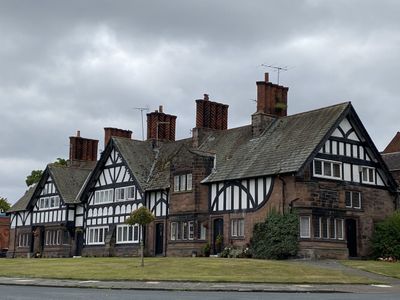
After a day spent touring around Westminster (and a dinner date with Robyn, who took the afternoon train from Kent to meet us for supper) it was time to head north. We made our way to Port Sunlight, a small village across the river from Liverpool.
I love train travel and I love train stations. But with no passenger rail service in Western Canada, it takes a while to get into the swing of things. On our first leg from Euston Station in London to Crewe, we mis-read our tickets and ended up on the wrong train. We took the London-Crewe train, which made sense to us, but it was the slow route, making all the stops. 'Our' train was ultimately going to Manchester, and Crewe was the third stop. Since the fast train left six minutes before the slow train, it was already gone when we realized our mistake. No matter. We saw all the things on the way to Crewe and caught later trains to Chester and then Port Sunlight.
We stayed at Port Sunlight on the invitation from my friend Emily, who I coached with in the altMBA. Emily and her husband Joe were incredibly gracious and took us all around their village and the surrounding area. Their daughters even moved back in with their parents so we could stay in their cottage. It was a luxurious treat and we were filled with gratitude to be able to see this area through their eyes.
Port Sunlight is a unique place that I never would have known if it weren't for Emily. It's a factory town, built in the 1870's by the Lever company to house the workers at the Lever soap factory. But unlike most factory towns, it was built with a focus on worker health and wellbeing and as a model for others to follow. The cottages are lovely; well built and with unique design features that make each block stand out from its neighbour. And the village is full of green spaces, halls, schools, community buildings and a stunning art gallery.
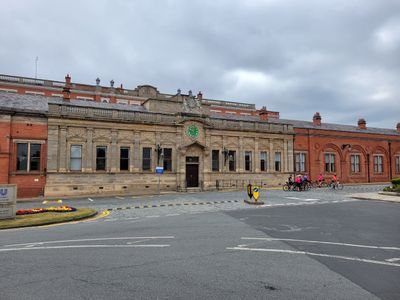
Lever's plan was good business too. Look at these clean, healthy workers in lovely little homes; you could be clean and lovely too with Sunlight Soap. Many of the houses faced the train station, so whether you stopped or not you got the sense that Lever Soap could brighten your life a little. And it worked; Lever Soap is now Unilever, which owns at least 1/3 of the consumer brands in the world!
And the best thing is that most of the charm of the village is preserved. Port Sunlight is working on getting UNESCO World Heritage status due to its historical significance. I'd sure vote in favour.
After our walking tour of the village, we met up with Joe and the four of us took the train into Liverpool. What a treat; both of our hosts grew up here, so we went to all their favorite places.
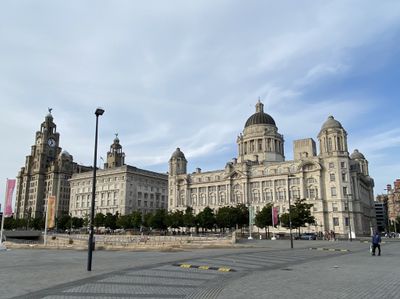
It was a sunny Saturday and central Liverpool was booming. From Lime Street station we took a wide loop that encompassed two huge cathedrals, built at opposite ends of Hope Street, named in 'hope' that the Catholics and Anglicans might get along.
The contrast between the two cathedrals was immense; the brown Anglican cathedral dominated the skyline with its Gothic arches and double-cross layout, whereas the Catholic cathedral was, well, interesting. First off, it's circular, with a series of antenna-like structures sticking up from the middle. From the outside, it looks like the nose cone of a space rocket. But inside, the cathedral is stunning - a huge open circle, with curved pews and the altar in the very center of the circle, with light streaming in from all angles via the inobtrusive stained glass windows.
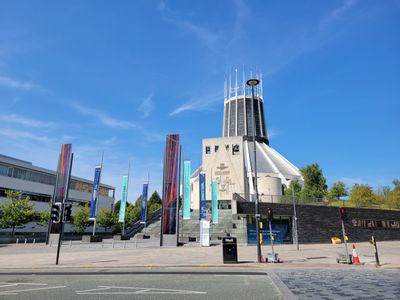
It turns out that the circular design was a result of a beautiful constraint. The original design was for a much larger and more traditional cathedral, with a large dome in the centre. But after the foundation and crypt were completed, the project ran out of money, so a competition was held for a new, modern design that would make use of the existing foundation but cost a fraction of the original. The result was a building that is unique and extremely moving, even for a non-religious person like me.
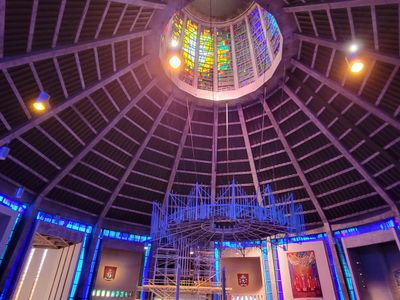
In the shadow of the two cathedrals lies an ample pub and restaurant area and on this hot summer Saturday evening it was humming. Liverpool is a popular destination for stag and hen dos, or what in Saskatchewan we'd call stag and stagette parties. But whereas we have a night out, these are weekend long affair. They do it up big here - the stags in matching t-shirts proclaiming their wild weekend (and once, matching sailor suits) and the hens wearing matching sashes and the bride-to-be with a tiara or veil. Even the mothers of the brides come along for the party. Everyone else in town seemed to be there too - the trains kept on unloading more and more people heading for a night out on the town.
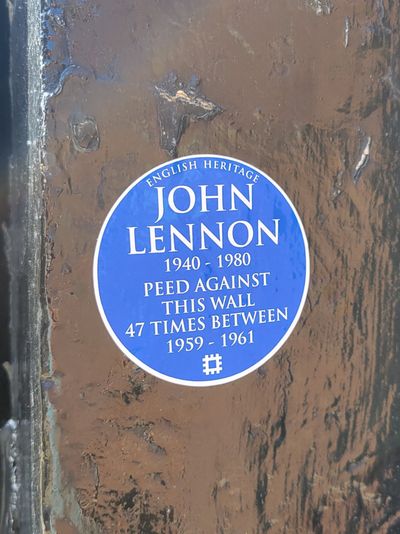
We made our way to the Albert Dock, on the banks of the Mersey. The huge red-brick buildings have been converted to shops and restaurants, yet they are a strong reminder of how Liverpool was one of the world's commercial hubs in the 19th century.
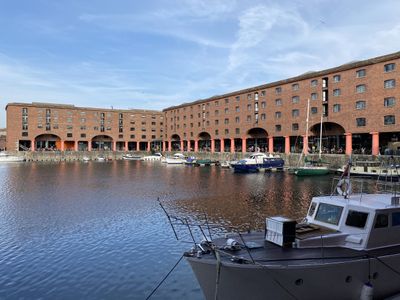
And that's what I took away from Liverpool. It's was a commerce city. The largest, most ornate, most well situated buildings aren't for religion or government, or manufacturing or finance, but for but for shipping and commerce. The rise of the merchant class. And when shipping patterns changed and modernized, Liverpool's influence faded. But what a place it must have been at its peak, when the empire's goods, resources and people all flowed through this port.
Emily and Joe had another adventure for us on Sunday. They picked us up at noon and we drove along the back roads to Chester. The drive was an adventure in itself; roads so narrow I don't know how two trucks could pass each other, bounded on each side by massive hedges. Every so often the hedges would part and we'd see a lovely green field, or a cute farmhouse, or a pub and clutch of houses at a cross-roads.
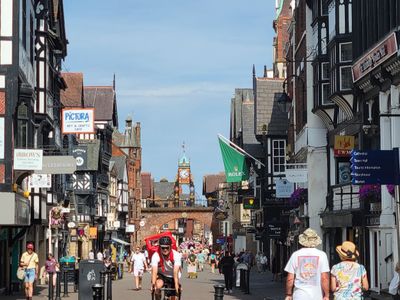
Chester is old. Like, Roman-times old. It sits on the edge of the River Dee, which forms the border between England and Wales, and has been a strategic fortress for 2000 years. There are layers of history here, from the ruins of the Roman amphitheatre (which was only rediscovered in 2005!) to the city walls that ring the centre of town, to the old town itself, which is contains several blocks of Tudor era houses.
And then there is the River Dee, which is narrow but cool and wet and, especially on this brilliantly hot summer day, was packed with people in rowboats, canoes, and paddleboards. There's a walking path and green space along the riverbank which was full of people as well, along with those lovely little kiosks selling coffee, wine and ice cream. Why oh why isn't Wascana Park and Beacon Hill Park back home full of these kiosks?
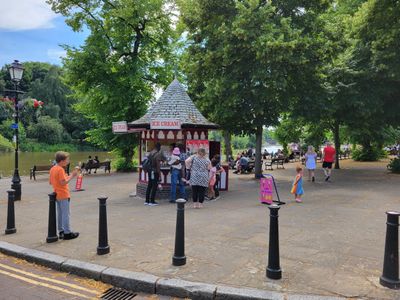
The highlight of the weekend wasn't all the history and architecture and walking about. It was our final evening in Port Sunlight, when Joe and Em called round and we walked over to the local pub for their Sunday Quiz Night. This was the quintessential village pub; lots of dark wood and old pictures on the walls, a couple of dozen regulars sitting in their usual seats, real cask ale and classic music in the background. And I mean the background! It was loud enough to hear but quiet enough that you could talk over it without raising your voice.
We each threw a couple of pound coins into the bucket and entered our team in the Quiz contest. 60 questions split into four sections, each hand crafted by the quiz master who read the questions from his position beside the bar. After each section we'd trade our answer sheet with the team beside us and mark each other's answer. And then they'd play a couple of songs and we'd start another round. The most charming bit was that the quiz master would wait until the end of the song to re-start the quiz! (PS - our team finished third and won $2.50!)
Then we had the Big Card raffle, where if your number came up you got to try your hand at guessing a high-low card sequence to win a progressive pot (there was a $1000 a few weeks back) and we ended with a few rounds of card bingo. What a joy.
Around midnight, as the Quiz Night ended, the MC wished Jimmy, one of the old timers, well because he was heading in for surgery tomorrow. The entire pub joined in a round of applause. A few folks made sure he had food on hand and someone to check in on him. I realized we were the only visitors to the pub that night - everyone else was this extended family. It was their pub and their little village, no different than the Lion's club in Dysart, Saskatchewan, except that this pub had been there for much, much longer.
As we walked home under the stars, and as Jimmy zoomed past us on his senior’s scooter, I was struck by how lovely it must be to live in a village like this, with the greenspaces and bowling clubs and your regular seat at the pub on Sunday night, but with the big city a short train ride away when you need it.
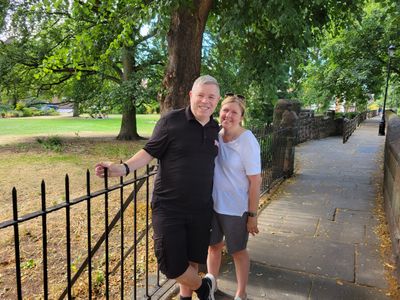
And I was filled with gratitude that I got to spend this time with Emily, a friend that I have only worked with over Zoom. How the permanence and stability of village life layers over these strange global connections we make almost effortlessly. What a time we live in, when we can sit down at our village pub, where our parents and great-grandparents sat, and when the fellow at the next table asks about your day, you can say you were working with your colleague in Canada and another in New Zealand, and hear their voice and see their faces, and feel like you know them. And then, sometimes, rarely, get to meet in person and get to know them better.